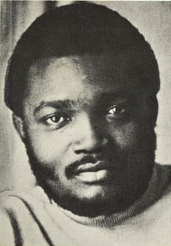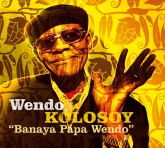Related Research Articles

Claude M'Barali, professionally known as MC Solaar, is a French rapper of Senegalese and Chadian origin. He is one of France's most famous and influential hip hop artists. Some consider him as the best French rapper of all time.
Music of the Democratic Republic of the Congo varies in its different forms. Outside Africa, most music from the Democratic Republic of Congo is called Soukous, which most accurately refers instead to a dance popular in the late 1960s. The term rumba or rock-rumba is also used generically to refer to Congolese music, though neither is precise nor accurately descriptive.
Soukous is a genre of dance music from Congo-Kinshasa and Congo-Brazzaville. It derived from Congolese rumba in the 1960s and gained popularity in the 1980s in France. Although often used by journalists as a synonym for Congolese rumba, both the music and dance associated with soukous differ from more traditional rumba, especially in its higher tempo, longer dance sequences. Notable performers of the genre include African Fiesta, Papa Wemba and Pépé Kallé.

Jules Shungu Wembadio Pene Kikumba, known professionally as Papa Wemba, was a Congolese singer and musician who played Congolese rumba, soukous and ndombolo. Dubbed the "King of Rumba Rock", he was one of the most popular musicians of his time in Africa and played an important role in world music. He was also a fashion icon who popularized the Sape look and style through his musical group Viva la Musica, with whom he performed on stages throughout the world.

Jean-Jacques Goldman is a French singer-songwriter and music record producer. He is hugely popular in the French-speaking world. Since the death of Johnny Hallyday in 2017 he has been the highest grossing living French pop rock act. Born in Paris and active in the music scene since 1975, he had a highly successful solo career in the 1980s, and was part of the trio Fredericks Goldman Jones, releasing another string of hits in the 1990s.

Ibrahima Sylla was a Senegalese record producer born in Ivory Coast and founder of the African music label Syllart Records. He was an internationally acclaimed musician whose production and music direction defined popular African music. From West African dance, to Congolese Soukous, to melodic griot-led songs, Sylla's signature as a music producer is unmistakable. He has demonstrated his familiarity with many contemporary African musical genres, and he has worked with most of Africa's musical greats.

François Luambo Luanzo Makiadi was a musician from Congo. He was a major figure in 20th-century Congolese music, and African music in general, principally as the leader for over 30 years of TPOK Jazz, the most popular and significant African band of its time. He is referred to as Franco Luambo or simply Franco. Known for his mastery of African Rumba, he was nicknamed by fans and critics "Sorcerer of the Guitar" and the "Grand Maître of Zairean Music", as well as Franco de Mi Amor by female fans.
Zaiko Langa Langa is a popular Contemporary band from DR Congo. Zaiko was named in 2000, by the Congolese Media Association, as the best Congolese musical group of the 20th century, and has been very influential. The word "Zaiko" is a portmanteau for the lingala phrase Zaire ya bankoko, meaning "Zaire of our ancestors", where "Zaire" must be read as a reference to the river by that name, now called Congo. The meaning of the phrase "Langa Langa" is controversial; according to the band's website, it means "marvelous" or "almighty".

Pascal-Emmanuel Sinamoyi Tabu, better known as Tabu Ley Rochereau, was a leading African rumba singer-songwriter from the Democratic Republic of the Congo. He was the leader of Orchestre Afrisa International, as well as one of Africa's most influential vocalists and prolific songwriters. Along with guitarist Dr Nico Kasanda, Tabu Ley pioneered soukous and internationalised his music by fusing elements of Congolese folk music with Cuban, Caribbean and Latin American rumba. He has been described as "the Congolese personality who, along with Mobutu, marked Africa's 20th century history." He was dubbed "the African Elvis" by the Los Angeles Times. After the fall of the Mobutu regime, Tabu Ley also pursued a political career. His musical career ran parallel to the other great Congolese rhumba bandleader and rival Franco Luambo Makiadi who ran the band TPOK Jazz throughout the 1960s, 1970s and '80s.

Joseph Athanase Tshamala Kabasele, popularly known as Le Grand Kallé, was a Congolese singer and bandleader, considered the father of modern Congolese music. He is best known for his role as leader of the band, Le Grand Kallé et l'African Jazz, in which capacity he was involved in a number of noted songs, including Indépendance Cha Cha.
(Also known as Quatre Etoiles du Zaire, Quatre Etoiles, 4 Etoiles, 4 Stars, versions with or without the accent on the E, etc.)
Nyboma Mwan'dido, often simply Nyboma, a prominent Congolese soukous tenor vocallist, has been over a fifty-year span a leading member of several outstanding bands, including Orchestre Lipua Lipua, Orchestre Kamale, Les Quatre Etoiles, and Kekele, in addition to performing and recording as a solo artist. He is widely recognized as one of the best singers in Congolese music.
Congolese rumba, also known as Rumba Lingala after its predominant language, is a popular genre of dance music which originated in the Congo basin during the 1940s, deriving from Cuban son. The style gained popularity throughout Africa during the 1960s and 1970s.

Antoine Wendo Kolosoy, known as Papa Wendo, was a Congolese musician. He is considered the "Father" of Congolese rumba, also known as soukous, a musical style blending son cubano, beguine, waltz, tango and cha-cha.
Pépé Kallé, sometimes written as Pepe Kalle was a soukous singer, musician and bandleader from the Democratic Republic of the Congo.
Jimmy Omonga is a singer and songwriter from the Democratic Republic of the Congo. With his debut album "Destin" (2008), he became within a few months one of Congo's new popular singers, known for his characteristic and unique voice; clear and ringing in its upper reaches, with soulful low notes.
Malage de Lugendo, is a DR Congolese soukous recording artist, composer and vocalist. He was a member of François Luambo Makiadi's seminal band TPOK Jazz, and Tabu Ley Rochereau's band Afrisa International.
Marie Solo, also known as Soleil Diva is a DR Congolese soukous singer, dancer, producer and composer.
Syran Mbenza is a guitarist, originally from the Congo, who has lived in Paris since about 1981. He has recorded and performed prolifically over five decades, including as a solo artist; as one of the four members of the popular soukous "supergroup" Les Quatre Étoiles; as a founding member of the acoustic, Congolese rumba revival band Kékélé; in other bands; and in support of numerous artists. He has been described as one of the greatest guitar players of Africa.
Franklin Boukaka was a Congolese baritone singer, guitarist, and songwriter who is recognized as a pioneer of Congolese popular music. He performed in bands based in each of "the two Congos," i.e., the countries now named the Republic of the Congo and the Democratic Republic of the Congo; toured worldwide; achieved broad popularity; took outspoken political stances; and is widely believed to have been the victim of an extrajudicial execution during an attempted coup in the Republic of the Congo.
References
- ↑ Rumba on the River: A History of the Popular Music of the Two Congos by Gary Stewart, Verso (2000) ISBN 1-85984-744-7
- 1 2 3 Afrisson: Pierre Moutouari biography (in French)
- ↑ Afrique nouvelle, Issues 1826-1851 (in French). 1984. Retrieved 22 July 2019– via Google Books.